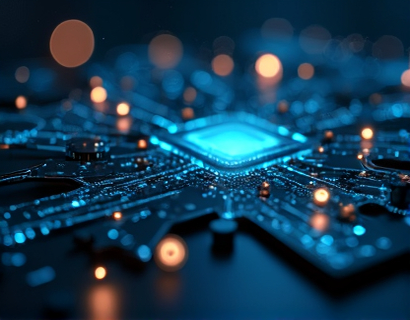AI-Powered Adaptive Learning: Transforming Education for Students and Lifelong Learners
In the rapidly evolving landscape of education, the integration of Artificial Intelligence (AI) has opened new avenues for personalized and adaptive learning experiences. This revolution is particularly significant for students and lifelong learners who seek tailored educational paths that cater to their unique needs and learning styles. An AI-driven platform can deliver personalized, adaptive learning experiences that not only enhance understanding but also foster a supportive and engaging environment. This article delves into how such technology is reshaping the educational journey, offering instant feedback and maximizing potential to achieve personal and professional goals.
The Need for Personalized Learning
Traditional educational methods often struggle to meet the diverse needs of all students. Classrooms are typically designed to accommodate an average learner, which can leave many students either under-challenged or overwhelmed. Personalized learning addresses this gap by adapting the educational content and pace to individual learners. AI plays a crucial role in this transformation by analyzing vast amounts of data to identify each student's strengths, weaknesses, and preferred learning styles. This data-driven approach ensures that the learning experience is not only tailored but also continuously optimized based on the student's progress.
How AI-Driven Platforms Work
AI-driven educational platforms use a combination of machine learning algorithms and natural language processing to create adaptive learning paths. These platforms begin by assessing the learner's current knowledge level through initial tests or quizzes. Based on the results, the system curates a customized curriculum that includes relevant materials, such as videos, readings, and interactive exercises. As the learner progresses, the AI continuously monitors performance and adjusts the difficulty and type of content to ensure optimal learning. This dynamic adjustment is key to keeping learners engaged and challenged at the right level.
Instant Feedback and Support
One of the most significant advantages of AI-powered adaptive learning is the immediate feedback it provides. Unlike traditional settings where feedback is often delayed, AI systems can offer real-time corrections and explanations. This instant feedback helps learners understand their mistakes and learn from them promptly, reinforcing correct concepts and addressing misunderstandings quickly. Additionally, AI can provide emotional and motivational support, recognizing when a learner is struggling and offering encouragement or suggesting breaks to prevent burnout. This supportive environment fosters a positive learning attitude and builds resilience.
Tailored to Unique Learning Styles
Every individual has a unique way of processing and retaining information. Some learners are visual, preferring diagrams and videos, while others are auditory, benefiting from lectures and discussions. Kinesthetic learners, on the other hand, learn best through hands-on activities. AI-driven platforms can identify and cater to these different learning styles by presenting content in the most effective formats for each learner. For instance, a visual learner might receive more infographics and videos, whereas an auditory learner might get access to podcasts and audio lectures. This customization ensures that each learner can engage with the material in a way that suits them best, enhancing comprehension and retention.
Enhancing Engagement and Motivation
Engagement is a critical factor in the success of any learning endeavor. AI-powered adaptive learning platforms incorporate gamification elements, such as badges, points, and leaderboards, to make the learning process more enjoyable and motivating. These elements tap into the learner's competitive spirit and sense of achievement, encouraging them to stay on track and push through challenging topics. Moreover, the personalized nature of the content keeps learners interested and invested in their progress, as they see tangible improvements in their knowledge and skills over time.
Lifelong Learning and Continuous Improvement
The benefits of AI-powered adaptive learning extend beyond formal education, making it an invaluable tool for lifelong learners. In a world where knowledge and skills must be continuously updated to keep pace with technological advancements and industry changes, adaptive learning platforms provide a flexible and accessible way to stay current. Whether it's learning a new language, acquiring a professional certification, or exploring a new hobby, these platforms offer the flexibility to learn at any time and from anywhere. The continuous feedback and adaptive content ensure that learners are always challenged and supported, fostering a habit of lifelong learning.
Case Studies and Success Stories
Numerous institutions and individuals have already experienced the transformative power of AI-powered adaptive learning. For example, a group of high school students used an adaptive math platform to improve their grades and confidence in the subject. The platform's ability to identify specific areas of weakness and provide targeted practice problems led to significant improvements in test scores. Similarly, professionals in various fields have utilized adaptive learning platforms to upskill and reskill, gaining the competitive edge needed in their careers. These success stories highlight the effectiveness of personalized learning in achieving educational and professional goals.
Challenges and Considerations
While the potential of AI-powered adaptive learning is vast, there are challenges and considerations that must be addressed. One key issue is the quality and accuracy of the AI algorithms. The system's effectiveness depends on the data it is trained on and the algorithms used to process that data. Ensuring that the AI is unbiased and inclusive is crucial to avoid perpetuating existing educational disparities. Additionally, there is a need for robust data privacy and security measures to protect learners' information. Educators and developers must also focus on integrating AI seamlessly into existing educational frameworks, ensuring that technology complements rather than replaces human interaction and guidance.
Future Prospects
The future of AI-powered adaptive learning is promising, with ongoing advancements in AI technology poised to enhance the educational experience further. Integration with virtual and augmented reality could create immersive learning environments that simulate real-world scenarios, making complex concepts more tangible and easier to understand. Artificial intelligence will continue to evolve, becoming more intuitive and responsive to individual needs. As more institutions and learners adopt these technologies, the educational landscape will become increasingly personalized and effective, breaking down barriers to access and excellence.
Conclusion
AI-powered adaptive learning represents a significant leap forward in education, offering personalized, interactive, and supportive learning experiences that cater to the unique needs of each student and lifelong learner. By leveraging the power of AI, educational platforms can provide instant feedback, adapt to different learning styles, and maintain high levels of engagement and motivation. As this technology continues to develop, it holds the potential to democratize education, making high-quality learning accessible to all. Embracing AI-driven adaptive learning is not just an option but a necessity for those seeking to thrive in a rapidly changing world.










































